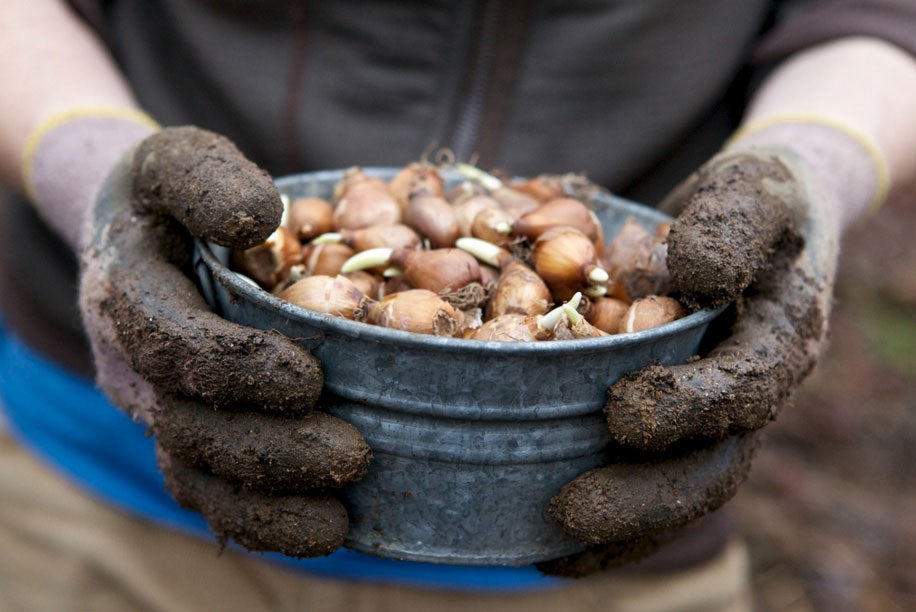Tips for first time gardeners
Listen 00:52:57First year gardening often resembles the opening of Raiders of the Lost Ark. Mike McGrath discusses how to avoid running away from a giant boulder as you try and grow your first tomatoes. Plus: Mike talks with fruit tree expert Lee Reich and your fabulous phone calls!
Question of the Week:
“I’m really excited about starting my very first vegetable garden! I started some lettuces and planted pepper and tomato seeds in biodegradable pots with organic seed starter. I’m doing a raised bed filled with 50/50 compost and top soil. Are there any particular bugs to look out for in my area? And what would you recommend to combat them? I know I need to put some type of fencing up to keep out deer and rabbits. Any other tips for a first timer would be great.”
— Roseann in Phoenixville, PA
Read Mike’s tips for first time gardeners »
-

Photo by Flickr user Chiot’s Run
Highlights from show for April 16, 2016:
Fixing lawn patches
Maureen in Delaware County, Pennsylvania has eight white pine trees in her yard, and therefore much of her lawn is shaded. The grass in her lawn is very patchy and, in some spots, completely dead. Mike says the trees are intercepting all of the moisture and nutrients in the soil. Mike tells Maureen to plan over the summer to have a nice load of top soil or compost delivered, and then find the most shade-tolerant grass seed she can find. Then, Mike suggests using moss as an alternative lawn cover in the front yard.
Manure for compost
Paul in Reading, Pennsylvania just adopted a dog, and wants to know if he can use her fecal waste to fertilize his lawn. Mike says there are two kinds of manures: manure from herbivores, and manure from carnivores. Cats and dogs have soft paws, so they’re very prone to picking up parasites, and those parasites are often found in their feces, so it can be dangerous to handles those materials. Mike suggests disposing of canine excrement in the same sewer system humans use, that way the waste is treated the same way before it returns to nature.
Featured Interview: Lee Reich, PhD
Lee Reich, PhD is an avid farmdener (more than a gardener, less than a farmer) with graduate degrees in soil science and horticulture. After working in plant and soil research with the USDA and Cornell University, he shifted gears and turned to writing, lecturing, and consulting. This week he joins us to talk about grafting. He tells us about this exciting cloning method, and exactly how we can go about performing this horticultural magic. Lee is the author or many books including Uncommon Fruits for Every Garden and Grow Fruit Naturally.
-

Lee Reich, PhD
Applying mulch
Anne in Haverford, Pennsylvania wants to mulch her azalea bushes and is thinking about buying some licorice root to do so, because she heard some bad things about wood mulch. Mike defines mulch as any substance you apply to soil that prevents weeds and retains moisture. Not all mulches are bad. It just so happens that wood mulch is often misused. Mike says no mulch should ever be deeper than two inches, and no mulch should ever touch a plant. Rather than licorice root or wood mulch, Mike recommends milled peat moss for the azalea bushes.
“No mulch of any kind should ever be run directly up to a house because that creates an underground passageway for subterranean termites to get to the house.”
Mike McGrath
Creating compost
Tony in Cherry Hill, New Jersey started composting last year, but his compost hasn’t fully broken down. He wants to know how long it needs to decompose before it can be used. In his compost, tony included egg shells, coffee grinds, leaves, some yard waste, and some kitchen waste. When asked, Tony said he did not shred the eaves, and Mike then asked him if the leaves made up at least three quarters of the compost. Mike points out that kitchen waste does not break down as well or as quickly as leaves, and it also can attract vermin. He tells Tony not to be discouraged because even leaves can take years to decompose, and most people fail on their first tries. Tony will have to wait to use his compost pile, but Mike suggests buying some in the meantime. Lastly, he recommends using worm bins to accelerate the decomposition of kitchen waste.
Failing forsythia
Trish in Wilmington, Delaware has a huge forsythia bush that used to bloom in an amazing golden hue, but has recently failed her. She says it now has no golden blooms, and very few green leaves. Trish admits she is not much of a gardner and has never pruned the bush, but Mike remains astounded because he couldn’t kill his forsythia bush if he tried. Trish describes her forsythia as a wonderful bird sanctuary. Mike asks if there are sunflower seeds in the bird feeder near her plant, and Trish affirms his suspicion. Mike tells us that there are two mysteriously harmful plants allopathic: one is the black walnut tree in its entirety, and the other is the seed of the sunflower.
-

Photo by Flickr user Brian Clark
WHYY is your source for fact-based, in-depth journalism and information. As a nonprofit organization, we rely on financial support from readers like you. Please give today.

